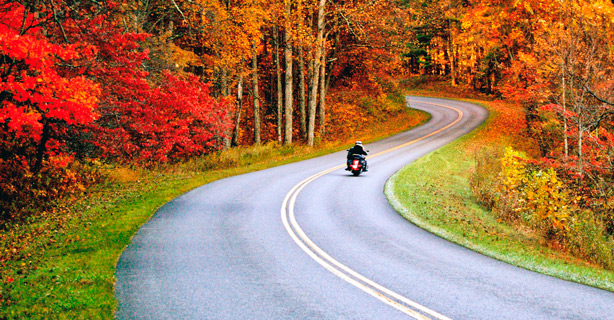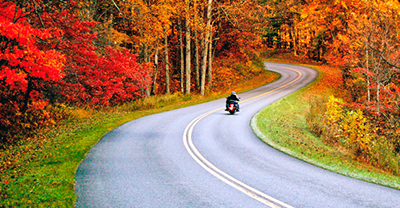Fall motorcycle riding tips: Safety for autumn roads


0 min. read
There’s nothing quite like a fall motorcycle ride. Crisp air and brilliant colors make the season unforgettable, and the view from the saddle is second to none. But the same leaves that brighten the landscape can also make pavement slick, and earlier dusk means reduced visibility. To help you keep the ride safe without losing any of the fun, we’ve put together some essential fall motorcycle tips.

Get your free motorcycle insurance quote today.
Make the most of the season’s beauty with safe riding
Fall is one of the most rewarding times to ride. Roads are often less crowded than in summer, and cooler weather keeps long days in the saddle more comfortable. But with those perks come new variables—changing traction, limited daylight, and unpredictable road conditions. Keeping these in mind helps you fully enjoy the ride without unwanted surprises.
Stay steady on wet leaves
Fallen leaves can be as slick as an oil spill, especially after rain. They can trap moisture underneath, sticking to your tires and reducing grip. Use extra caution in these types of situations:
In corners: Enter smoothly, hold your line, and avoid sudden throttle or brake inputs.
At stops: Check your footing before putting weight on a boot. A slip at a stop sign can be just as dangerous as one at speed.
While braking: Apply brakes progressively, not abruptly. Even ABS can’t overcome lost traction on a blanket of wet leaves.
Look out for covered road markings and hidden hazards
The shorter days of fall can add risk as you may be riding in the dark more often. And if leaves are concealing markings or debris, limited visibility can make it harder to react in time.
Dry leaves might not be slippery, but they can hide important details on the road. Make sure to watch for:
Painted lane markings or arrows
Potholes and uneven pavement
Sewer grates or roadside curbs
Oil, coolant, or broken glass from previous accidents
Slow down, use high beams when appropriate, and increase following distance to give yourself options.

Get a motorcycle insurance quote to check your coverage options.
Park with care around leaf piles
It might be convenient to stop near a pile of leaves, but it can put your bike at risk. Hot exhaust pipes or catalytic converters can ignite dry leaves in seconds. Always choose a clear parking spot—and if you’re parking at home, keep your driveway clear of leaves where your bike will sit.
Take precautions at intersections
Leaves often gather where traffic slows and changes direction, which makes intersections especially risky. Hidden beneath piles you may find:
Large painted surfaces and crosswalks
Slippery fluids from idling vehicles
Debris pushed to the curb by passing traffic
Approach intersections at a controlled speed, and scan ahead for patches of leaves that might hide a hazard.
Adjust to cooler nights and fading light
Fall days can be warm and inviting, but temperatures drop quickly after sunset. That can create two issues for riders:
Visibility: Sunset comes earlier, and dusk is one of the hardest times for other drivers to see motorcycles. Consider reflective gear or auxiliary lighting.
Surface temps: Cooler pavement reduces tire traction, especially at the start of a ride. Give your tires a few miles to warm up before pushing speed or maximizing lean angle.
Enjoy fall rides—with coverage built for riders
Autumn riding is more than just transportation—it’s an experience that combines beautiful scenery, comfortable weather, and the freedom of two wheels. With a little awareness and preparation, you can enjoy everything the season offers without letting hazards take you by surprise.
Dairyland®, a brand of the Sentry Insurance Group, has been protecting riders and their motorcycles for more than 50 years. We understand the riding lifestyle and the unique challenges that come with it—because motorcycle insurance isn’t an afterthought for us, it’s a specialty. Contact us today to review your coverage options.

Get a quote for motorcycle insurance coverage that fits your riding style.
The general information in this blog is for informational or entertainment purposes only. View our blog disclaimer.










